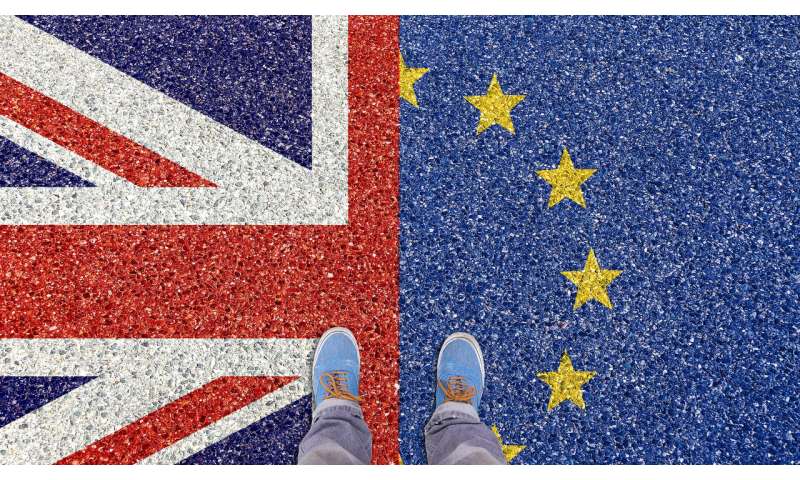#When two tribes go to war: How tribalism polarized the Brexit social media debate
“#When two tribes go to war: How tribalism polarized the Brexit social media debate”

Tribal behavior on social media widened the gulf between Remain and Leave voters in the United Kingdom’s debate whether to leave the European Union, re-aligned the UK’s political landscape, and made people increasingly susceptible to disinformation campaigns, new research from the University of Bath shows.
The study focused on use of tribal language on Twitter over three years since the 2016 referendum on membership of the European Union, in particular the usage and frequency of derogatory terms such as ‘Remoaner’—an insult hurled at pro-EU voters by Brexiters, who in turn might be labeled ‘Brextremists’ by Remainers.
“Brexit is one of the first examples of political tribalism on social media. UK voters are now divided along a new line—whether they voted Leave or Remain,” said Samantha North, researcher at the University of Bath’s School of Management.
“Tribalism has become a central force in today’s political discussion, especially due to online influence campaigns that leverage this kind of division. Our research illustrates how political tribalism unfolds on social media over time. We hope it could provide impetus for new initiatives that aim to bring people together,” she said.
North said previous studies had shown tribalism was an innate human quality to which no group was immune. But the nature of social media—Twitter in this case—meant humans were increasingly susceptible or vulnerable to disinformation and fake news.
“The need to belong to a tribe can have an effect on people’s psychological biases, such as confirmation bias, the willingness to believe information that supports the tribe’s viewpoint while being overly critical about information that challenges it,” she said.
The research showed the four keywords—Remainer, Brexiteer, Remoaner and Brextremist—were frequently used to mark group identity. She observed that Brexit voters often accused Remain voters with language related to immaturity or childish behavior, such as ‘whining’ or ‘throwing the dummy out of the pram’ by not supporting the outcome of the vote. They tended to characterize Remainers as arrogant, elitist and traitors.
For their part, Remainers tended to characterize the Leave side as racist, uneducated or ignorant of what they were doing.
Irony played a part too in language—with some Remainers co-opting Brexit language with the sign-off ‘Proud Remoaner’.
“Tribe members use information as a way to broadcast their identity as part of the tribe and, in so doing, seek approval from other members—in the form of likes, comments and shares on social media.
This has implications for the spread of online disinformation, as the search for approval may encourage people to broadcast content that reflects the views of their tribe, regardless of whether that information is accurate,” North said.
North said the study showed the tribal behavior occurred more frequently on the pro-Brexit side, with the Leave side posting a greater number of links to partisan websites, compared with the Remain side.
The study also established that real-life events—such as the UK triggering Article 50, and the second People’s Vote March—generated spikes in use of the four tribal keywords on Twitter.
North observed that the current business model for social media platforms, which rely on engagement to boost their bottom lines, was a challenge for creating a more even-handed discussion. She suggested platforms could change the algorithms that dictate what content shows up on user news feeds to make it more diverse, although she also noted that this was unlikely to happen without regulation and legislation.
“Tribalism poses a distinct risk to truth and democracy. We hope our results will help inform the discussion on how to build cohesion between warring political groups,” North said.
More information:
Samantha North et al, Battle for Britain: Analyzing Events as Drivers of Political Tribalism in Twitter Discussions of Brexit, Policy & Internet (2020). DOI: 10.1002/poi3.247
When two tribes go to war: How tribalism polarized the Brexit social media debate (2020, August 26)
retrieved 26 August 2020
from https://phys.org/news/2020-08-tribes-war-tribalism-polarized-brexit.html
This document is subject to copyright. Apart from any fair dealing for the purpose of private study or research, no
part may be reproduced without the written permission. The content is provided for information purposes only.
If you want to read more Like this articles, you can visit our Science category.
if you want to watch Movies or Tv Shows go to Dizi.BuradaBiliyorum.Com for forums sites go to Forum.BuradaBiliyorum.Com

